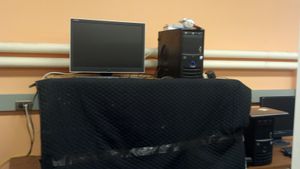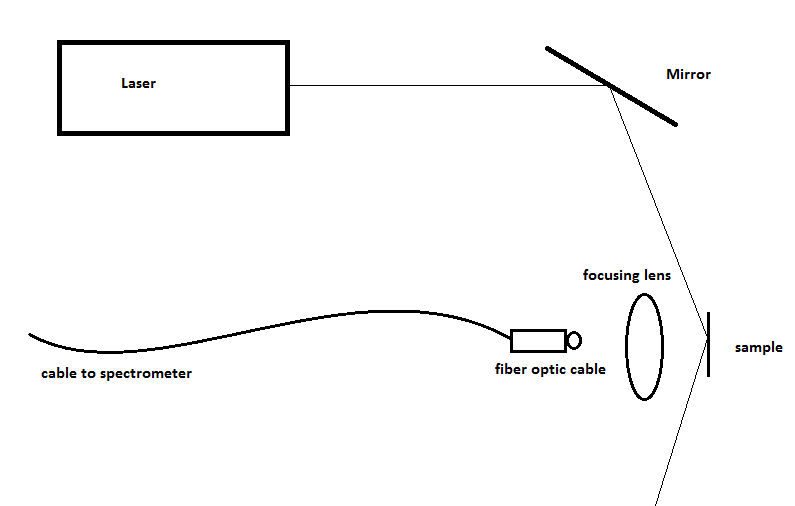No edit summary |
No edit summary |
||
| Line 13: | Line 13: | ||
== Design == | == Design == | ||
=== Equipment List === | === Equipment List === | ||
Pavilion Integration Corp W445-40FS 445 nm laser | *Pavilion Integration Corp W445-40FS 445 nm laser | ||
Thor Labs LB1761-A N-BK7 Bi-Convex Lens, Ø1", f = 25.4 mm, Anit-Reflective Coating: 350-700nm | *Thor Labs LB1761-A N-BK7 Bi-Convex Lens, Ø1", f = 25.4 mm, Anit-Reflective Coating: 350-700nm | ||
Thor Labs KM100-E02 Kinematic Mount for Ø1" Optics with Visible Laser Quality Mirror | *Thor Labs KM100-E02 Kinematic Mount for Ø1" Optics with Visible Laser Quality Mirror | ||
Ocean Optics USB2000+VIS-NIR spectrometer | *Ocean Optics USB2000+VIS-NIR spectrometer | ||
Ocean Optics 600 micron VIS NIR fiber optics cable part # QP600-2-VIS-NIR | *Ocean Optics 600 micron VIS NIR fiber optics cable part # QP600-2-VIS-NIR | ||
* | *[[open-source_optics_base|Open-Source Optics Base]] | ||
* | *[[open-source_simple_semiconductor_sample_holder|Open-Source Simple Semiconductor Sample]] | ||
* | *[[open-source_lens_holder|Open-Source Lens Holder]] | ||
* | *[[open-source_mirror_mount|Open-Source Mirror Mount]] | ||
*[[open-source_fiber_optic_cable_holder|Open-Source Fiber Optic Cable]] | |||
== Open source | ===Design Schematic=== | ||
[[Image:Open-source-PL_setup.png]] | |||
===Picture of Setup=== | |||
[[Image:PL-test-bench.jpg|thumb|left|Fig 1. The PL Test Bench]] | |||
[[Image:PL-setup.jpg|thumb|left|Fig 2. The PL Setup]] | |||
== See also == | == See also == | ||
Revision as of 23:56, 15 August 2012
Introduction
Photoluminescence is the process where a substance absorbs photons and reemits photons. The incident photons excite electrons from a lower energy level to a higher energy level. As the electrons relax from the higher energy level to the lower energy level a photon is released. For a semiconductor, the electrons are excited from a set of energy levels called the valence band to a higher set of energy levels called the conduction band. The energy area between the valence band and the conduction band is called the band gap, and no electrons can be energetically found here.
Photoluminescence (PL) Spectroscopy is a type of contactless and nondestructive probing method for determining the electronic structure of a sample. In PL Spectroscopy, a laser is fired at a sample and the resulting fluorescence is measured by a spectrometer. The measured fluorescence can be used to determine the bandgap of a semiconductor sample, impurity levels and possible defects in the sample, and the recombination mechanisms within the sample [1]. The determination of the electronic bandgap for a semiconductor is the primary focus of this work.
As previously stated, in a semiconductor the electrons are excited from the valence to the conduction band. When electrons relax from the conduction band back down to the valence band, photons will be released. These photons will have energy that matches the transition from the conduction band to the valence band. Measuring the emitted photons’ wavelength with a spectrometer will reveal the energy of the photon and therefore the size of the bandgap.
Design
Equipment List
- Pavilion Integration Corp W445-40FS 445 nm laser
- Thor Labs LB1761-A N-BK7 Bi-Convex Lens, Ø1", f = 25.4 mm, Anit-Reflective Coating: 350-700nm
- Thor Labs KM100-E02 Kinematic Mount for Ø1" Optics with Visible Laser Quality Mirror
- Ocean Optics USB2000+VIS-NIR spectrometer
- Ocean Optics 600 micron VIS NIR fiber optics cable part # QP600-2-VIS-NIR
- Open-Source Optics Base
- Open-Source Simple Semiconductor Sample
- Open-Source Lens Holder
- Open-Source Mirror Mount
- Open-Source Fiber Optic Cable
Design Schematic
Picture of Setup




